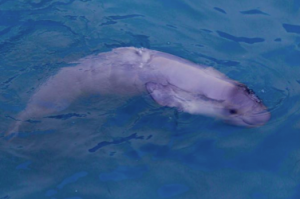The Alaska SeaLife Center (ASLC) is saddened to announce the loss of the rescued beluga calf found stranded following a storm in South Naknek, Alaska on June 18.
Over the past several weeks a team of marine mammal experts from ASLC, Georgia Aquarium, Shedd Aquarium and SeaWorld has been providing intensive around-the-clock care to the calf. While the team faced a number of obstacles regarding the calf’s rehabilitation, it became evident yesterday that the young whale’s condition continued to decline. The team became more concerned as the evening progressed, but despite all efforts the calf passed away shortly after midnight.
The calf would have never survived as long as he did had it not been for the incredible care this expert team was able to provide – as this remains the first known U.S. rescue of a stranded live beluga calf since the Marine Mammal Protection Act of 1972.
“We are deeply saddened by the loss of this beluga calf,” said Tara Riemer Jones, president and CEO of the Alaska SeaLife Center. “But we are incredibly proud of the care that the multi-institution animal and veterinary team provided. The knowledge they brought from the whales in their care at their home institutions allowed us to provide the best medical and animal care possible to this calf. There is more we will continue to learn about beluga whales as a result of this loss that will ultimately benefit beluga whales in the marine mammal community and in the wild.”
A full necropsy will be performed by ASLC veterinary staff later today. It is likely further tests will be conducted over the coming months, and a cause of death may never be known.
The Alaska SeaLife Center is the only permanent marine rehabilitation center in Alaska, responding to stranded wildlife such as sea otters, harbor seals, and whales. The stranding program responds to beluga whales with the authorization of NOAA. The Alaska SeaLife Center operates a 24-hour hotline for the public to report stranded marine mammals or birds, and encourages people who have found a stranded or sick marine animal to avoid touching or approaching the animal; instead, those individuals should call 1-888-774-SEAL (7325).





